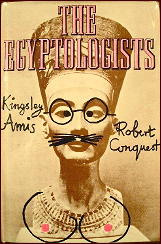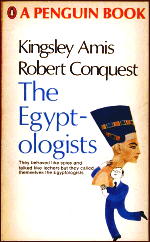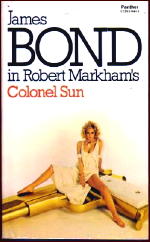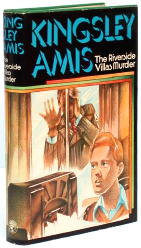Tue 22 Sep 2009
A Review by David L. Vineyard: KINGSLEY AMIS & ROBERT CONQUEST – The Egyptologists.
Posted by Steve under Authors , Reviews[7] Comments
KINGSLEY AMIS & ROBERT CONQUEST – The Egyptologists. Jonathan Cape, UK, hardcover, 1965. Random House, US, hardcover, 1966. UK paperback reprints: Penguin 2769, 1968; Panther, 1975.

Who are the Egyptologists?
Just what goes on behind the sedate doors of the Metropolitan Society for Egyptology of London?
Women would like to know — no woman is allowed to join — especially wives.
The BBC would like to know — their expose of the Society ended up in a virtual on air brawl.
Egyptologists would like to know — no one with the least academic credentials is allowed to join.
MI6 would like to know — you know how nosy spies are.
Scotland Yard would like to know — the Vice Squad just raided the place, and now a society member has gone missing. Could it be foul play?
Well, actually yes, but not the kind readers of this blog might expect.
Funny too, the wives think, that all of their husbands suddenly developed an interest in Egyptology at the same time. Especially when they had never shown the least interest in the subject before. Or anything else remotely academic.

Readers familiar with Kingsley Amis will no doubt have already developed a theory about just what the Society is up to, or what exactly their mysterious Project Nefertiti is. And just how did they break one of breasts off the bust of Nefertiti by attempting to put a bra on her? And why?
Kingsley Amis was a literary gadfly who burst on the literary scene with Lucky Jim, a comedy of manners and sex at Oxford. The books that followed took him from dirty young man (That Uncertain Feeling — the basis for the Peter Sellers film Only Two Can Play) to dirty old man (One Fat Englishman), laughing, jibing, and harpooning the comfortable all the way.
He also championed science fiction, writing one of the key works of criticism in the field (The New Maps of Hell) with the co-author of The Egyptologists, Robert Conquest.
He championed Ian Fleming and James Bond in The James Bond Dossier and Every Man His Own 007 (as William Tanner), and penned the first and one of the best Bond pastiche in Colonel Sun, published as by Robert Markham.

And he refused to sit still. The Alteration is a startling tale of an alternate world where a group tries to save a young boy from being made a castrati by the all powerful Catholic Church — it was chosen one of the 100 best modern science fiction novels.
He wrote a coming of age novel in the form of a murder mystery, The Riverside Villa Murders, and a spy novel that was a meditation on morality, The Anti-Death League.
His horror novel The Green Man was chosen one of the 100 best modern horror novels — it is also drop dead funny. It was made into a mini series and shown on A&E with Albert Finney in the leading role.
I won’t give away the secret of the Metropolitan Egyptological Society, but nothing good lasts forever.
Science fiction fans will also enjoy the many references to the genre from theories of alien invasion, to Professor Asimov, of Krakow who almost never publishes anything …

If you aren’t familiar with Amis work, this is a perfect place to start. It reads much like one of the great British film comedies of the fifties and sixties (a few of which were based on Amis novels), you won’t be alone if you find yourself casting the novel as you read it with those great British character actors.
You won’t forget the secret of The Egyptologists, alas for them, neither will their wives.
Sadly membership is closed, but then your wife would never approve of your spending your Thursday evenings there.
You know what those ancient Egyptians were like — well, actually, if you do, you couldn’t be a member anyway. You wouldn’t want an actual Egyptologist in the Metropolitan Egyptological Society — that would hardly be fair to the members.
You wouldn’t want them to waste their Thursdays discussing ancient Egypt would you?
That would be a complete waste of valuable time.
And believe me, the Egyptologists have better things to do.
Editorial Comment: For what it’s worth — and in case you were wondering — this book is NOT included in Al Hubin’s Crime Fiction IV.
Or should that be NOT YET?
September 22nd, 2009 at 7:40 pm
Al might want to include this one with an asterisk. It isn’t a mystery, but it does involve Scotland Yard and a possible murder investigation however minor their role.
If a vice raid qualifies or a sort of large scale con game (though not for money), then it deserves a small place, maybe a mention.
September 22nd, 2009 at 9:52 pm
An asterisk, at best, but I’ll pass the suggestion on!
September 23rd, 2009 at 9:44 am
Says Al, after I’d made sure he saw David’s comment as well as his review:
“…it’s worth including with a dash…thanks.”
The dash being the equivalent of an asterisk in terms of being included in CRIME FICTION IV.
September 23rd, 2009 at 1:04 pm
I should like Kingsley Amis better than I do. LUCKY JIM struck me as shallow and obvious, THE ANTI-DEATH LEAGUE diverting but nothing more, and THE GREEN MAN as the distinctly un-scary sexual fantasies of a man growing old. Yet critics love him, so the fault, no doubt, is in my self.
September 23rd, 2009 at 3:04 pm
This sounds like quite a romp, David. I’ll be on the lookout. The only Amis book I’ve read is Colonel Sun.
September 23rd, 2009 at 5:56 pm
Humor is so subjective. What I find hilarious, another reader might not find funny at all. For instance I’ve read LUCKY JIM a couple times and think it’s an excellent comedy. Yet Dan in Comment #4 did not like it. I know what he means when he says “…so the fault, no doubt, is in my self.”
Often, when I realize I’m at fault for not understanding a great novel, I make an attempt to study other opinions and try and figure out what I’m missing. Sometimes this works and sometimes not. For instance James Joyce’s FINNEGAN’S WAKE I consider unreadable, despite reading several books explaining it. On the other hand I like his other work and think some of it is great writing. Joyce once said something along the line that it took him 18 years to write FINNEGAN’S WAKE and he would expect the reader to spend 18 years reading it. Unfortunately most of us do not have the time or patience.
September 23rd, 2009 at 8:00 pm
Walker
There is a trick to reading Finnegan’s Wake, but we are all too old for it. It involves a college campus, a large gathering, alternate readings out loud of passages and even chapters, and as I recall a good deal of drinking. There was sex involved too if you gave a particularly good performance, but it was the late sixties and early seventies and almost everything involved sex.
In any case once you read it aloud it stops being gibberish, but drinking probably still helps.
Reading is always subjective. I’ve never been able to get through Silas Marner. Dostoevsky is brilliant, but most of his work is too gloomy for me. I admire Proust, but likely won’t be reading him again. Luckily we can recognise something’s importance without being a fan.